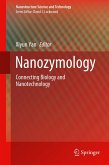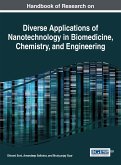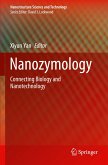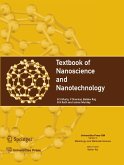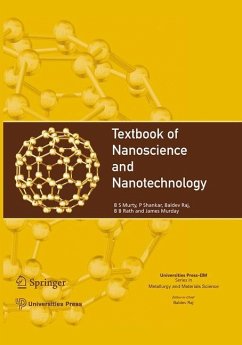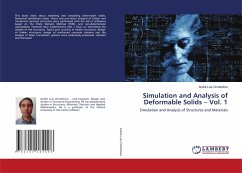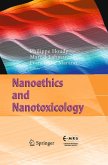Nanotoxicology and Nanoecotoxicology Vol. 1
Herausgegeben:Kumar, Vineet; Guleria, Praveen; Ranjan, Shivendu; Dasgupta, Nandita; Lichtfouse, Eric
Nanotoxicology and Nanoecotoxicology Vol. 1
Herausgegeben:Kumar, Vineet; Guleria, Praveen; Ranjan, Shivendu; Dasgupta, Nandita; Lichtfouse, Eric
- Gebundenes Buch
- Merkliste
- Auf die Merkliste
- Bewerten Bewerten
- Teilen
- Produkt teilen
- Produkterinnerung
- Produkterinnerung
This book discusses the basics of nanotoxicity and gives a detailed account of methods used for toxicity evaluation of nanomaterials. It also gives indepth coverage of the effect of different types of nanomaterials, including organic and inorganic, on various aquatic animals, microorganisms and plants, and outlines recent challenges, regulatory frameworks and advances in nanotoxicity testing.
Andere Kunden interessierten sich auch für
![Nanozymology Nanozymology]() Nanozymology119,99 €
Nanozymology119,99 €![Handbook of Research on Diverse Applications of Nanotechnology in Biomedicine, Chemistry, and Engineering Handbook of Research on Diverse Applications of Nanotechnology in Biomedicine, Chemistry, and Engineering]() Handbook of Research on Diverse Applications of Nanotechnology in Biomedicine, Chemistry, and Engineering361,99 €
Handbook of Research on Diverse Applications of Nanotechnology in Biomedicine, Chemistry, and Engineering361,99 €![Nanozymology Nanozymology]() Nanozymology119,99 €
Nanozymology119,99 €![Textbook of Nanoscience and Nanotechnology Textbook of Nanoscience and Nanotechnology]() B. S. MurtyTextbook of Nanoscience and Nanotechnology127,99 €
B. S. MurtyTextbook of Nanoscience and Nanotechnology127,99 €![Textbook of Nanoscience and Nanotechnology Textbook of Nanoscience and Nanotechnology]() B. S. MurtyTextbook of Nanoscience and Nanotechnology90,99 €
B. S. MurtyTextbook of Nanoscience and Nanotechnology90,99 €![Simulation and Analysis of Deformable Solids ¿ Vol. 1 Simulation and Analysis of Deformable Solids ¿ Vol. 1]() André Luis ChristoforoSimulation and Analysis of Deformable Solids ¿ Vol. 138,99 €
André Luis ChristoforoSimulation and Analysis of Deformable Solids ¿ Vol. 138,99 €![Nanoethics and Nanotoxicology Nanoethics and Nanotoxicology]() Nanoethics and Nanotoxicology106,99 €
Nanoethics and Nanotoxicology106,99 €-
-
-
This book discusses the basics of nanotoxicity and gives a detailed account of methods used for toxicity evaluation of nanomaterials. It also gives indepth coverage of the effect of different types of nanomaterials, including organic and inorganic, on various aquatic animals, microorganisms and plants, and outlines recent challenges, regulatory frameworks and advances in nanotoxicity testing.
Produktdetails
- Produktdetails
- Environmental Chemistry for a Sustainable World 59
- Verlag: Springer / Springer International Publishing / Springer, Berlin
- Artikelnr. des Verlages: 978-3-030-63240-3
- 1st edition 2021
- Seitenzahl: 336
- Erscheinungstermin: 14. April 2021
- Englisch
- Abmessung: 241mm x 160mm x 23mm
- Gewicht: 731g
- ISBN-13: 9783030632403
- ISBN-10: 3030632407
- Artikelnr.: 60331865
- Herstellerkennzeichnung Die Herstellerinformationen sind derzeit nicht verfügbar.
- Environmental Chemistry for a Sustainable World 59
- Verlag: Springer / Springer International Publishing / Springer, Berlin
- Artikelnr. des Verlages: 978-3-030-63240-3
- 1st edition 2021
- Seitenzahl: 336
- Erscheinungstermin: 14. April 2021
- Englisch
- Abmessung: 241mm x 160mm x 23mm
- Gewicht: 731g
- ISBN-13: 9783030632403
- ISBN-10: 3030632407
- Artikelnr.: 60331865
- Herstellerkennzeichnung Die Herstellerinformationen sind derzeit nicht verfügbar.
Dr. Vineet Kumar is currently working as Assistant Professor in the Department of Biotechnology, LPU, Jalandhar, Punjab, India. Previously he was Assistant Professor at DAV University, Jalandhar, Punjab, India and UGC-Dr DSK postdoctoral fellow (2013-2016) at the Department of Chemistry and Centre for Advanced Studies in Chemistry, Panjab University, Chandigarh, India. He has worked in different area of biotechnology and nanotechnology in various institutes and universities namely, CSIR-Institute of Microbial Technology, Chandigarh, India, CSIR-Institute of Himalayan Bioresource Technology, Palampur, HP, India and Himachal Pradesh University, Shimla, HP India. His areas of interest is Nano-Biotechnology. He has published many articles in these areas featuring in peer-reviewed journals. He is also serving as editorial board member and reviewer for international peer reviewed journals. He has received various awards like senior research fellowship, best poster award and postdoctoral fellowship etc. Dr. Praveen Guleria is presently working as Assistant Professor in the Department of Biotechnology at DAV University, Jalandhar, Punjab, India. She has worked in the areas of Plant Biotechnology, Plant Metabolic Engineering and Plant Stress Biology at CSIR- Institute of Himalayan Bioresource Technology, Palampur, H.P. India. Her research interests include plant stress biology, plant small RNA Biology, plant epigenomics and nanotoxicity. She has published several research articles in various peer-reviewed journals. She is also serving as the editorial board member and reviewer for certain international peer reviewed journals. She has been awarded the SERB- Start Up Grant by DST, GOI. She has also been awarded the prestigious "Bharat Gaurav Award" in 2016 by the India International Friendship Society, New Delhi. She has also received various awards like CSIR/ ICMR- Junior research Fellowship, CSIR- Senior research fellowship, State level merit scholarship awards. Dr. Shivendu Ranjan is scientist at the Chaperon Biotech, SIDBI Centre, Indian Institute of Technology, Kanpur, India. He is also serving as a senior research associate, adjunct, at the Faculty of Engineering and Built Environment, University of Johannesburg, South Africa. His research interests include nanotechnology, nanomedicine, science policy and diplomacy.He is associate editor of Environmental Chemistry Letters and editorial board member of Biotechnology and Biotechnological Equipment. He has received 20 awards and honors. Dr. Nandita Dasgupta has vast working experience in nanoscience and is working as Assistant Professor at Department of Biotechnology, Institute of Engineering and Technology, Lucknow, India. She has worked on Mesenchymal stem cell derived exosomes for the treatment of uveitis. She has successfully engineered micro-vehicles for model drug molecules. Her areas of interest include nanomaterial fabrication and its applications in medicine, food, environment, agriculture and biomedical. She is the associate editor of Environmental Chemistry Letters. She has received several awards and recognitions from different national and international organizations. Dr. Eric Lichtfouse is an environmental chemist working at the University of Aix-Marseille, France. He has invented carbon-13 dating. He is teaching scientific writing and communication, and has published the book Scientific Writing for Impact Factors. He is founder and Chief Editor of scientific journals and series in environmental chemistry and agriculture. He got the Analytical Chemistry Prize from the French Chemical Society, the Grand Prize of the Universities of Nancy and Metz, and a Journal Citation Award by the Essential Indicators.
Preface.- Chapter 1. Introduction, Principles, and Concepts.- Chapter 2. Nanomaterials and Health.- Chapter 3. Safety and Utility of Nanomaterials on Reproduction and Development: an Update of Alternative Methods.- Chapter 4. Nano-Toxicity to Microbes: Potential Implications of Nanomaterials on Microbial Activity.- Chapter 5. Nanomaterials Causing Cellular Toxicity and Genotoxicity.- Chapter 6. Exploring Microbial Nanotoxicity Against Drug Resistance in Bacteria.- Chapter 7. Toxicity of Engineered Nanostructures in Aquatic Environments.- Chapter 8. In Vitro Methodologies For Toxicological Assessment Of Drug Delivery Nanocarriers.- Chapter 9. Impact Of Nanomaterials On The Food Chain.- Chapter 10. Phytoresponse to Nanoparticles Exposure.- Chapter 11. Environmental Impact and Econanotoxicity of Engineered Nanomaterials.
Preface.- Chapter 1. Introduction, Principles, and Concepts.- Chapter 2. Nanomaterials and Health.- Chapter 3. Safety and Utility of Nanomaterials on Reproduction and Development: an Update of Alternative Methods.- Chapter 4. Nano-Toxicity to Microbes: Potential Implications of Nanomaterials on Microbial Activity.- Chapter 5. Nanomaterials Causing Cellular Toxicity and Genotoxicity.- Chapter 6. Exploring Microbial Nanotoxicity Against Drug Resistance in Bacteria.- Chapter 7. Toxicity of Engineered Nanostructures in Aquatic Environments.- Chapter 8. In Vitro Methodologies For Toxicological Assessment Of Drug Delivery Nanocarriers.- Chapter 9. Impact Of Nanomaterials On The Food Chain.- Chapter 10. Phytoresponse to Nanoparticles Exposure.- Chapter 11. Environmental Impact and Econanotoxicity of Engineered Nanomaterials.


